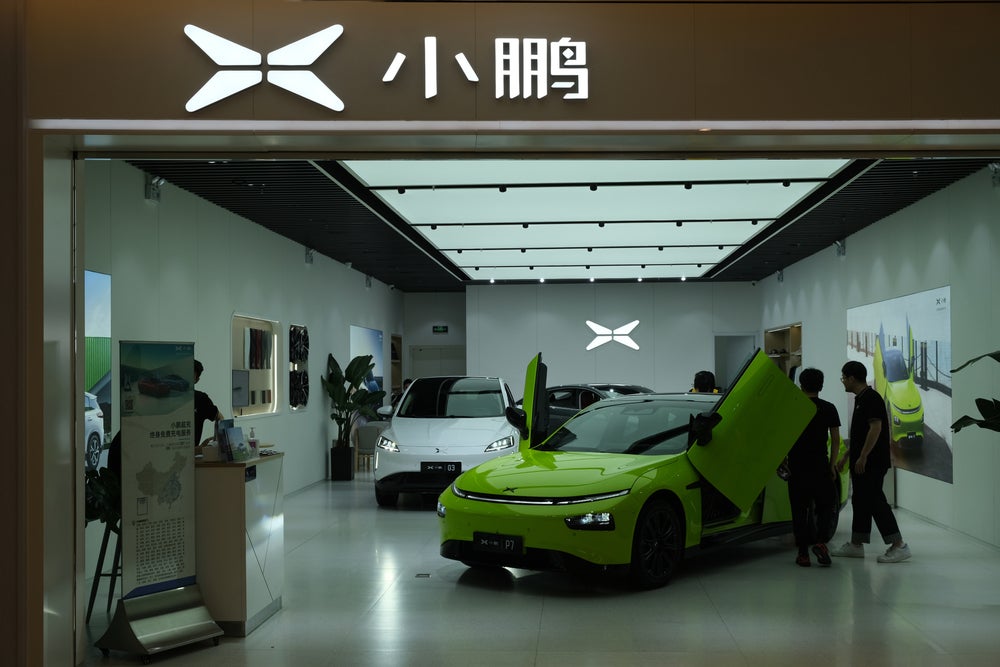
Chinese electric vehicle (EV) maker, XPeng, will soon deliver half its output to countries outside China, Vice President and Chairman Brian Gu has said. He added that the company would start exporting cars to Denmark, Sweden and the Netherlands in 2022.
“As a company that focuses on global opportunities, we want to be balanced with our contribution of delivery – half from China, half from outside China – in the long run,” Gu said in an interview with CNBC.
The Guangzhou-based company – with a dual listing in New York and Hong Kong – is often described as famous US-based EV maker Tesla’s main rival. Tesla recently disclosed that China accounted for roughly 23% of its overall sales, up from 20% a year ago.
Tesla, of course, already has a large international customer base, with over 50% of its total sales being outside the US, according to its third-quarter results.
Gu did not specify a timeline for XPeng’s foreign expansion plans. In December of 2020, the Chinese EV manufacturer began shipping cars to Norway. It is not alone: US-listed Chinese car brand Nio recently opened a flagship store in Oslo. Another Chinese automotive giant, BYD, said it aimed to deliver 1,500 EVs to Norway by the end of the year.
Chinese companies are clearly interested in the Nordic country, most likely due to strong governmental support for EVs there.
How well do you really know your competitors?
Access the most comprehensive Company Profiles on the market, powered by GlobalData. Save hours of research. Gain competitive edge.

Thank you!
Your download email will arrive shortly
Not ready to buy yet? Download a free sample
We are confident about the unique quality of our Company Profiles. However, we want you to make the most beneficial decision for your business, so we offer a free sample that you can download by submitting the below form
By GlobalDataIn July, XPeng made its debut on the Hong Kong Stock Exchange in a dual-primary listing, bringing the company closer to home. Unlike many other Chinese companies, such as Alibaba and NetEase, which have sold shares through a secondary listing in Hong Kong, a dual-primary listing means that XPeng must follow Hong Kong disclosure and corporate governance standards closely.
Arguably, the company perhaps opted for this approach following Beijing’s crackdown on companies wanting the list in the US. One notable victim was ride-hailing company Didi Chuxing which was investigated by several Chinese regulatory bodies a few days after its debut on the New York Stock Exchange.
“In the long run, though, we would like to have a listing venue that gets us closer to home because we’re a consumer brand in China. Ultimately we want our customers to be our shareholders, and having the dual primary listing status in Hong Kong will give us eligibility to be connected to Chinese capital markets,” Gu said at the time.
Since then XPeng has done well in the Chinese market, selling more cars than expected in the third quarter. While automotive manufacturers worldwide have been struggling amid the ongoing semiconductor shortage, XPeng achieved a 14% jump in deliveries in Q3.
The Chinese appetite for electric vehicles is clear. A GlobalData report on EVs goes so far as to say that China is a “spellbinding” force in the theme of New Energy Vehicles (NEVs). This includes plug-in hybrids (PHEVs), hybrid electric vehicles (HEVs), battery electric vehicles (BEVs) and fuel cell electric vehicles (FCEVs).
XPeng’s latest financial report shows that its revenue has risen to 5.7bn yuan (US$892m), beating average analyst expectations of 5.2bn yuan, according to Bloomberg. XPeng’s shares went up nearly 14% in New York last week. Over the past year, the startup saw its share price climb 19%.
That said, the company is not profitable yet. In fact, it reported greater-than-expected losses of 1.77 yuan (US$0.27) per share, versus the expectation of a 1.17 yuan loss, according to StreetAccount.
A bumpy road to cross-border cooperation
Foreign car manufacturers have a history of cooperation in China, but it hasn’t always been straightforward. As far back as 1984, Volkswagen became the first Western car manufacturer to enter the Chinese market, establishing a joint venture with Shanghai Motor Industry Corporation (SAIC).
At the time, China’s automobile industry was still in its infancy, with a national market scale of no more than a few hundred thousand units per year. In 1994, the government officially introduced a 50% limit on foreign ownership in Chinese manufacturing enterprises, hoping to support national industrial development and to create a balanced domestic environment. The “market-for-technology” era of Chinese car manufacturers was thus born.
As a result, foreign brands such as Nissan, Ford and Audi could not own more than 50% shares in a Chinese auto company. This had the dual effect of stifling local automotive R&D in China, as companies knew they could obtain Western technology in exchange for market access – while also ensuring that Chinese-made cars were obsolete and unattractive, as Western firms were reluctant to supply their latest designs and equipment to ventures they did not control. The long expected rise of Chinese manufacturing in global automotive markets failed to occur.
This may account for the fact that President Xi Jinping made a radical policy change, announcing in April 2018 that foreign companies could own a controlling interest in Chinese auto firms. At around the same time, global shifts towards EVs and away from traditional cars gave Chinese industry a chance to start from scratch on equal terms, rather than trying to duplicate the huge expertise of overseas car industries in making combustion-engined vehicles.
Car manufacturers in China now believe that they have sufficient competitiveness in the NEV sector to compete with international names – and XPeng might just prove them right.







